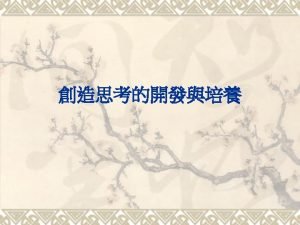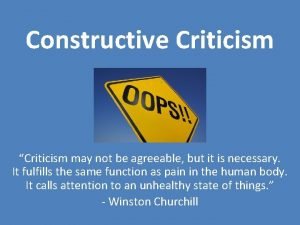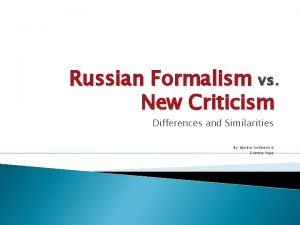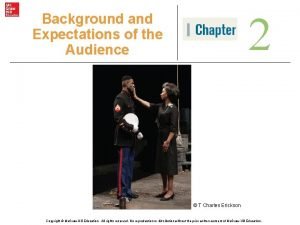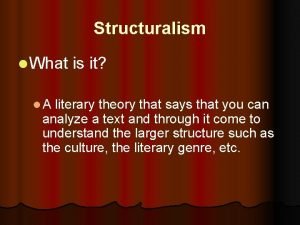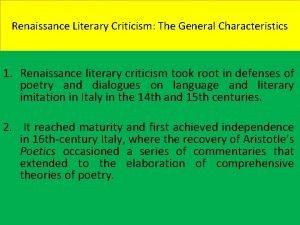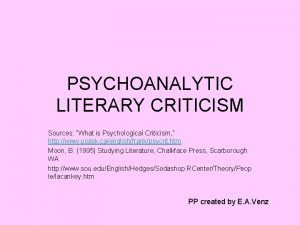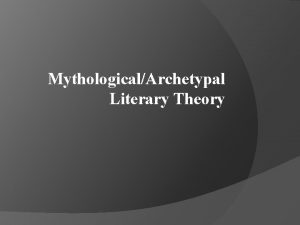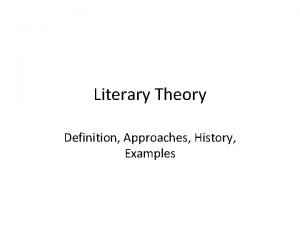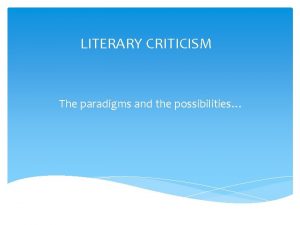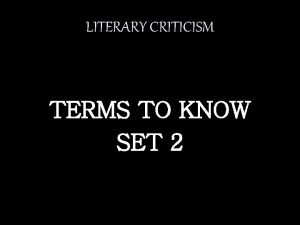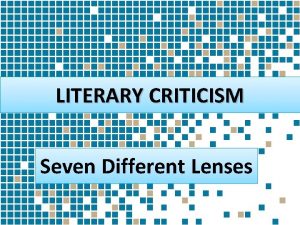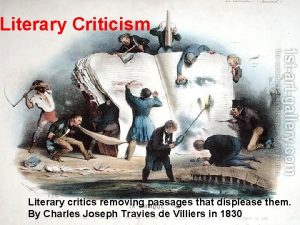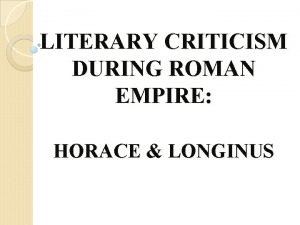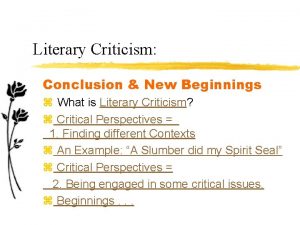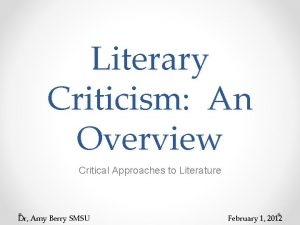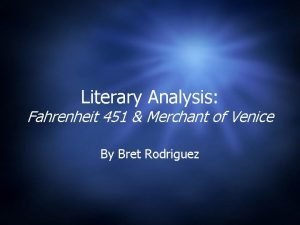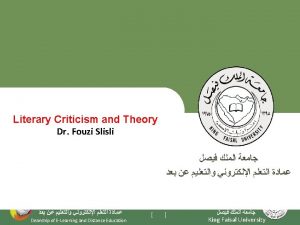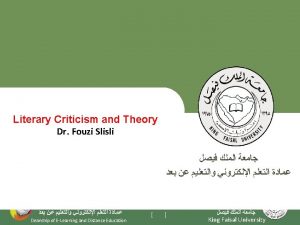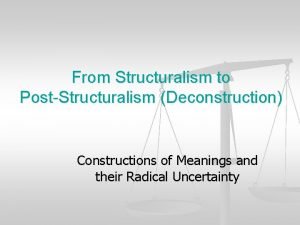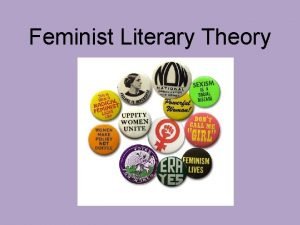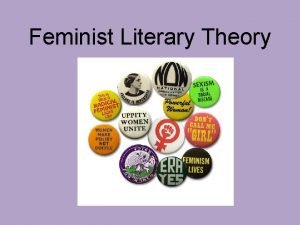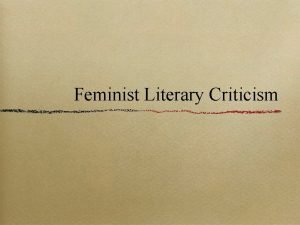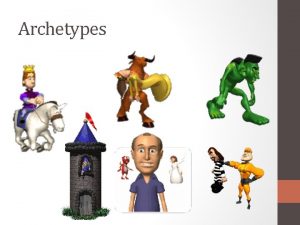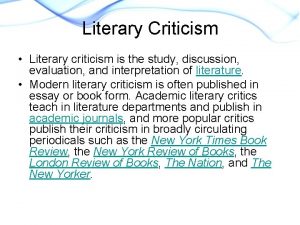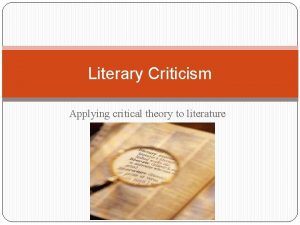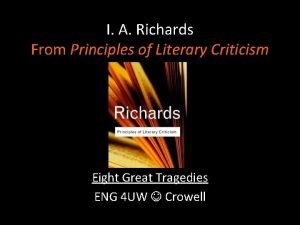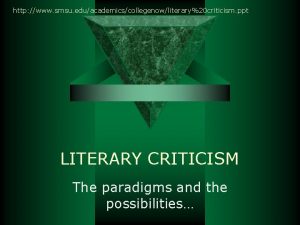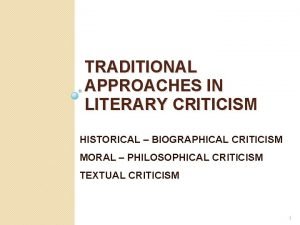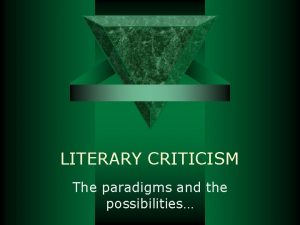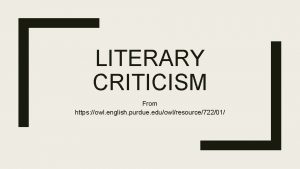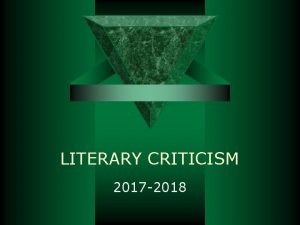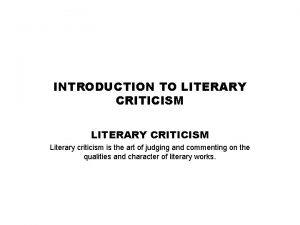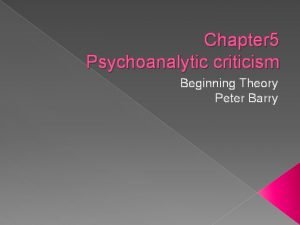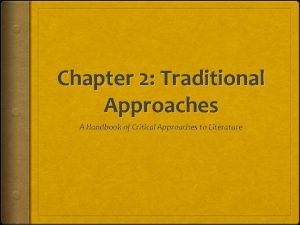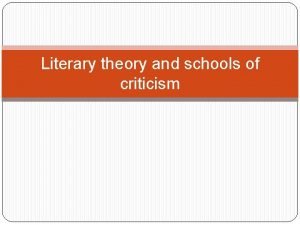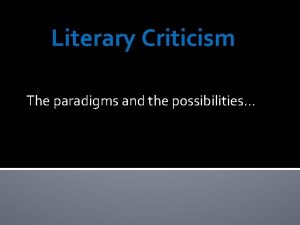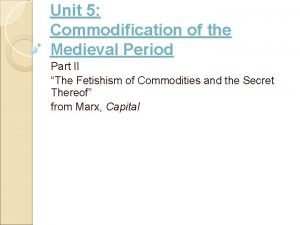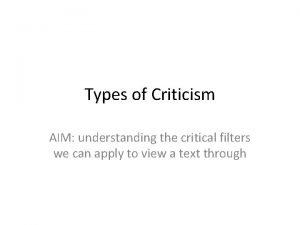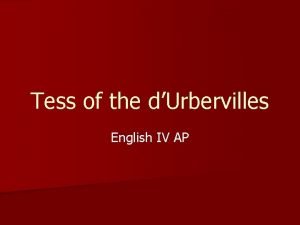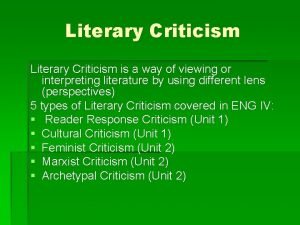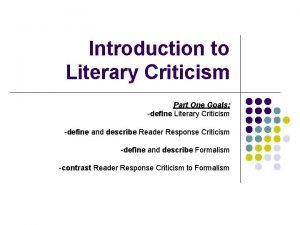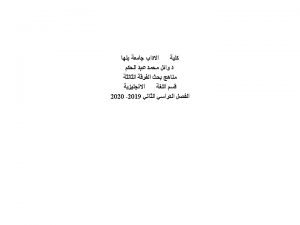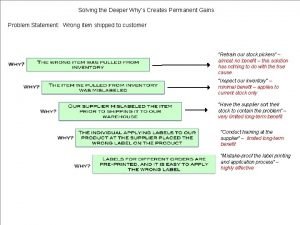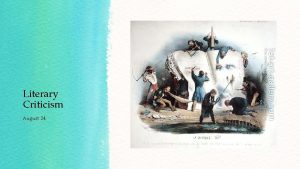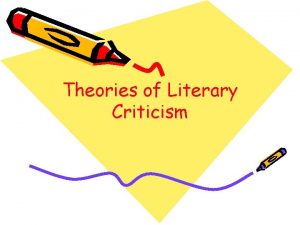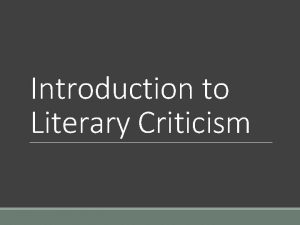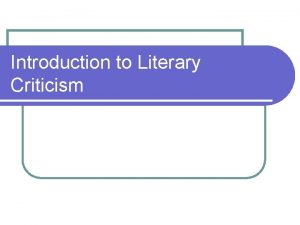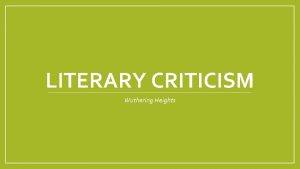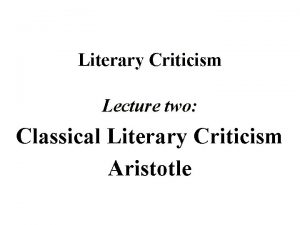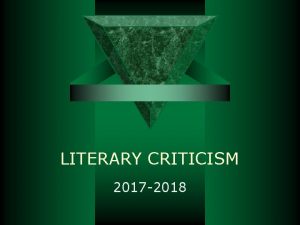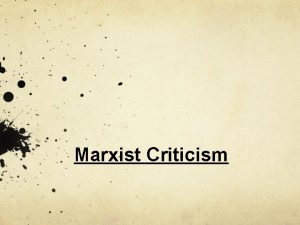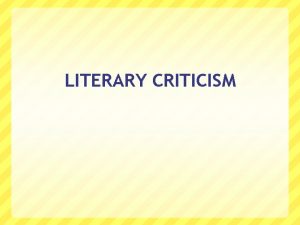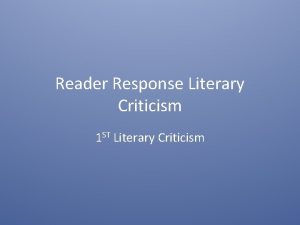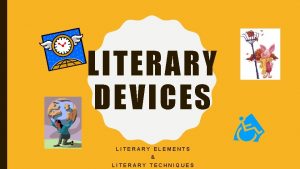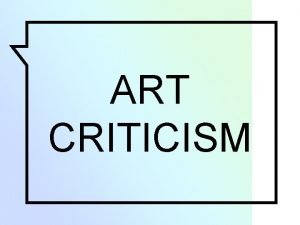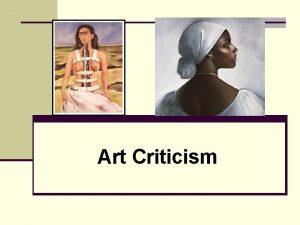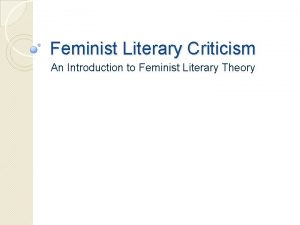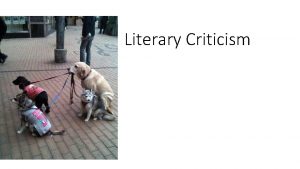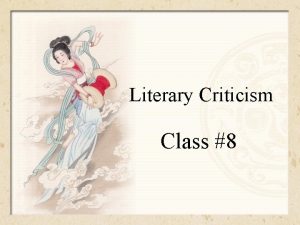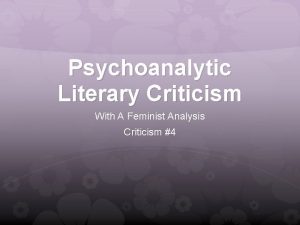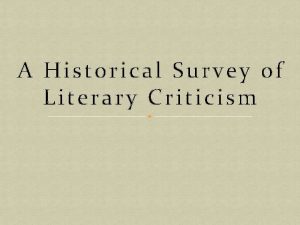Literary Criticism An Introduction Why Criticism Literary criticism
















































- Slides: 48

Literary Criticism An Introduction

Why Criticism? Literary criticism has several primary purposes: • To allow a reader multiple meanings, potentially increasing the impact of a text on a reader • To formulate understandings of text • To help us resolve a difficulty in the reading. • To enable us to form judgments about literature. • To help us choose the better of two conflicting readings. So which school is better? Whichever allows for the best discourse resulting in the greatest impact upon the reader.

Contemporary Schools of Criticism • New Criticism • Feminist Criticism • Psychoanalytic • • • Criticism Marxist Criticism Deconstruction Reader-response Criticism Postcolonial Criticism New Historicism Mary Shelley – Frankenstein …Making horror sexy long before Stephen King

New Criticism (Also known as Formalism) A New Critic/ Formalist will: 1. Focus on the text itself, a technique also known as “close reading” 2. Ignore authorial intention when devising meaning 3. Ignore readers personal responses when devising meaning

4. Ignore social context of the work – no relevance is given to the history that produced it, gender issues, class issues, or social justice 5. Place importance on internal structure, imagery, symbols, figurative language, plot, POV and other text –driven elements

6. Emphasis is placed on language, on the ways connotation, ambiguity, irony, paradox reinforce meaning 7. Central Question of NC is not: What does a text mean, but: How does a text mean? 8. A work of literatures worth is derived from unity of these elements (the complexities uniting to form meaning) Robert Penn Warren – All the King’s Men and New Critic adherent

Advantages to NC: • Can be performed with little research • Emphasizes literature apart from context (rendering it, in effect, timeless) • Nearly all schools of literature must begin a reading with this step Disadvantages to NC: • Text is seen in isolation, it takes nothing from previous literature and contributes nothing to future literature • It cannot account for allusions • It reduces literature to a collection of rhetorical devices (albeit a unified collection)

Key NC terms: • tension - the integral unity • • of the poem which results from the resolution of opposites, often in irony of paradox intentional fallacy - the belief that the meaning or value of a work may be determined by the author's intention affective fallacy - the belief that the meaning or value of a work may be determined by its affect on the reader T. S. Eliot – Poet and New Critic, rumored to be a great listener

• external form - rhyme scheme, meter, stanza form, etc. • objective correlative - originated by T. S. Eliot, this term refers to a collection of objects, situations, or events that instantly evoke a particular emotion. • Heresy of Paraphrase - assuming that an interpretation of a literary work could consist of a detailed summary or paraphrase.

Gender/Feminist Criticism • Is concerned with the impact of gender on writing and reading. • Examines at ways characters of differing genders are presented within a single text • Hopes to widen the conventional notions of gender by examining arbitrary expectations imposed by cultures/societies • May begin with a critique of patriarchal culture.

• Is concerned with the place of female writers in the cannon. • Includes a search for a feminine theory or approach to texts. • is political and sometimes revisionist (attempts to reevaluate and restate the past based on newly acquired standards) • may argue that male fears are portrayed through female characters. • may argue that gender determines everything, or just the opposite: that all gender differences are imposed by society, and gender determines nothing.

Additional FC theory: In A Literature of Their Own, Elaine Showalter argued that literary subcultures all go through three major phases of development. For literature by or about women, she labels these stages the Feminine, Feminist, and Female: • Feminine (Stage 1) - involves "imitation of the prevailing modes of the dominant tradition" and "internalization of its standards. " • Feminist (Stage 2)- involves "protest against these standards and values and advocacy of minority rights. . “ • Female (Stage 3) - this is the "phase of self-discovery, a turning inwards freed from some of the dependency of opposition, a search for identity. " Edna St. Vincent Millay – Poet and rebel extraordinaire

Advantages: • Informs on an underrepresented agenda • Seeks out fresh perspectives • Attempts to redress problems of inequality in discourse Disadvantages • Turns criticism into a political battlefield as opposed to a literary one • Overlooks merits of works determined to be patriarchal • When arguing for a “women’s style” may reduce women to victim status Virginia Woolf – Mrs. Dalloway, demolisher of social constructs

Psychoanalytical Critics Freudian Critics: • See literature as dream like and full of symbols that mask true meaning • Utilize Freud’s ideas of repressed wounds, fears, unresolved conflicts, and guilty desires that are carried over from childhood into adult lives • Utilizes Freud’s tri-part division of the mind: Ø The ego (conscious self) Ø The id (the unconscious, instinctual, and primitive self – source of the sex drive – the pleasure seeking center) Ø The superego (self that has internalized society’s notions of right and wrong – the repressor of instinct)

• Utilizes Freud’s tri-part division of the mind: ØThe ego (conscious self) ØThe id (the unconscious, instinctual, and primitive self – source of the sex drive – the pleasure seeking center) ØThe superego (self that has internalized society’s notions of right and wrong – the repressor of instinct)

• See concave objects (ponds, • pools, flowers, cups, caves, tunnels) as female imagery See objects that are longer than they are wide as phallic (male) Other examples: • Dancing, riding, flying are associated with sexual pleasure • Water is associated with the womb, the maternal female and death • Freudian critics occasionally discern the presence of an Oedipus complex (a boy's unconscious rivalry with his father for the love of his mother) Sigmund Freud – theorist, cocaine lover, cigar aficianado

Jungian Critics (Archetypal criticism) • Sees an influential force in myth (archetypes) • are generally concerned with his concept of the process of individuation (the process of discovering what makes one different form everyone else). • Believe a neurosis occurs when someone fails to assimilate one of these unconscious components into his conscious and projects it on someone else. • Believes the persona must be flexible and be able to balance the components of the psyche. Carl Jung – Theorist, inspirer of many professors’ wardrobes

• Jung labeled three parts of the self: Øthe shadow, or the darker, unconscious self (usually the villain in literature) Øthe persona, or a man's social personality (usually the hero) Øthe anima, or a man's "soul image" (usually the heroine)

Advantages: • It can be a useful tool for understanding some works in which characters have obvious psychological issues. (Hamlet) • Knowing something about a writer's psychological make up can give us insight into her work.

Disadvantages: • Psychological criticism can turn a work into little more than a psychological case study, neglecting to view it as a piece of art. • Critics sometimes attempt to diagnose long dead authors based on their works, which is perhaps not the best evidence of their psychology. • Critics tend to see sex in everything, exaggerating this aspect of literature. • Some works do not lend themselves readily to this approach.

Marxist Criticism Marxist Critics: • See society as propelled by economics, a tool of the class system • Believes proletariat (working class) does not see how their lives are subject to forces beyond their control

• Believes proletariat have a false consciousness about history and material well-being • Believe the false consciousness prevents proletariat from seeing their values have been socially constructed and keeps them in their place • Seeks to unmask society’s ideologies (literature both represents and projects this ideology)

Key Terms in MC: • Commodificaion - the attitude of valuing • • things not for their utility but for their power to impress others or for their resale possibilities Conspicuous consumption - the obvious acquisition of things only for their sign value and/or exchange value Dialectical materialism - theory that history develops neither in a random fashion nor in a linear one but instead as struggle between contradictions that ultimately find resolution in a synthesis of the two sides. For example, class conflicts lead to new social systems

• Material circumstances - the economic conditions underlying the society. To understand social events, one must have a grasp of the material circumstances and the historical situation in which they occur • Reflectionism - a theory that the superstructure of a society mirrors its economic base and, by extension, that a text reflects the society that produced it • Superstructure - The social, political, and ideological systems and institutions--for example, the values, art, and legal processes of a society

Advantages: • Accounts for major forces that affected authors’ world Disadvantages: • As with feminism, can politicize literature, thus removing focus from the art • Limits scope of interpretation • Not always applicable • Often used by those whose agenda is other than determining literary meaning • Too theoretical for some Karl Marx – Theorist, grower of fine beards

Deconstruction • Undermines Western • philosophy’s black/white, good/bad mentality by establishing binary opposition but finding meaning in the discussion, rather than the two elements themselves, put another way… …DC argues that binary opposites are not really opposed, but interconnected – one cannot be known without the other – meaning cannot occur without both (différance ) – in interconnection there is meaning Jacques Derrida – Philosopher, Frenchmen, pipe smoker

• works against seeing language as a stable, closed system • A shift from the idea that there is definite, central meaning to a text • Proposes that language is not neutral but filled with biases, assumptions, and values • Thus language distorts perception of the world and is not a stable or reliable force, thus absolute meaning cannot be determined

Radiohead’s Thom Yorke has been called rock’s deconstructionist as his music and lyrics tend to undermine western assumptions of music as well as western philosophies and culture Disadvantages to DC: • Promotes an anything goes ideology that when taken to the extreme produces interpretations that are less than academic Advantages to DC: • Allows for any interpretation but promotes academic rigor in that interpretations must be incredibly self conscious and “on guard” to be considered academically viable

Key Terms : • Aporia (ah-por-EE-ah)- a moment of undecidability; the inherent contradictions found in any text, being caught between binary opposites • Différance - To oversimplify: words are always at a distance from what they signify and, to make matters worse, must be described by using other words. (Words) Work of Literature Work of Analysis (Words) How can unstable language systems be accurate?

• Logocentrism – the idea that western thought (meaning white European) has established a culture around a set of supposedly universal principals and beliefs.

• The Logic of Supplementation – Idea #1: A supplement is something that is added to another something that is already complete and could stand on its own • Writing is the supplement of speech • Eve is the supplement of Adam in Paradise Lost Vs. • Idea #2: If something needs a supplement then it is not complete. Ø This lack is called the “Orginary Lack” Ø The supplement that fills the orginary lack is called the “Invagination”

Reader-Response Criticism • analyzes the reader's role in the production of meaning. • Is the opposite of formalistic (new criticism) criticism. • the text itself has no meaning until it is read by a reader. The reader creates the meaning • can take into account the strategies employed by the author to elicit a certain response from readers.

• denies the possibility that • • works are universal (that they will always mean more or less the same thing to readers everywhere) "each reader will impose his or her 'identity theme' on the text, to a large extent recreating that text in the reader's image. “ Therefore, we can understand someone's reading as a function of personal identity. Text Author Reader Text Author Meaning

Advantages: • It recognizes that different people view works differently, and that people's interpretations change over time. • Promotes investigation of both self and text • Juxtaposed values helps forge both identity and meaning

Disadvantages: • Reader Response criticism tends to make interpretation too subjective. • Does not provide adequate criteria for evaluating one reading in comparison to another. • Often mistaken for simply giving an opinion about the text His theory is just as good as yours.

New Historicism • Historical / Biographical critics see works as the reflection of an author's life and times (or of the characters' life and times). They believe it is necessary to know about the author and the political, economical, and sociological context of his times in order to truly understand his works. Jon Krakauer’s book Into the Wild examined the life of Chris Mc. Candless, who rebellion against society lead to his death. Try and tell that story without acknowledging the times. (Penn’s movie is a masterpiece, by the way)

• Different from Old “Historicism” as it acknowledges that recorded history is biased and subject, thus constituting a single possibility among many. • Tries to portray an era accurately by examining a variety of interconnected discourses and their struggles with each other (IE: Religion vs. Politics, State vs. Federal, Cuban vs. U. S. )

Advantages: • This approach works well for some works which are obviously political or socio-critical • Works to add meaning that might otherwise be present. (For instance: knowing Milton was blind adds considerable meaning to "On His Blindness“ or knowing that Thoreau wrote Civil Disobedience during the Mexican War adds another level of meaning to the text

• It is necessary to take a historical approach in order to place allusions in their proper classical, political, or biblical background. Disadvantages: • New Critics would call this the "the intentional fallacy, ” believing that NC reduces art to the level of biography and makes it relative to the time of its writing rather than any universal meaning

Postcolonial Criticism • Literally, postcolonialism • refers to the period following the decline of colonialism, e. g. , the end or lessening of domination by European empires. Although the term postcolonialism generally refers to the period after colonialism, the distinction is not always made.

• It focuses on the culture (literature, politics, history, and so forth) of former colonies of the European empires, and their relation to the rest of the world • Postcolonial writers attempt both to resurrect their culture and to combat preconceptions about their culture.

Key Terms: • Alterity - lack of identification with some part of one's personality or one's community, differentness, otherness • Diaspora (d. I-ASP-er-ah- is used to refer to any people or ethnic population forced or induced to leave their traditional ethnic homelands, being dispersed throughout other parts of the world, and the ensuing developments in their dispersal and culture • Eurocentrism - the practice, conscious or otherwise, of placing emphasis on European (and, generally, Western) concerns, culture and values at the expense of those of other cultures.

• Hybridity - an important concept in post • colonial theory, referring to the integration (or, mingling) of cultural signs and practices from the colonizing and the colonized cultures Imperialism - the policy of extending the control or authority over foreign entities as a means of acquisition and/or maintenance of empires, either through direct territorial control or through indirect methods of exerting control on the politics and/or economy of other countries. The term is used by some to describe the policy of a country in maintaining colonies and dominance over distant lands, regardless of whether the country calls itself an empire

Debatable Points in Postcolonialism • First, literal colonization is • not the exclusive object of postcolonial study. Some talk in terms of entities other than governments being oppressive, colonizing forces. Second, among the works commonly studied under this label, some written while still under a colonial government. Derek Walcott – author of Omeros – a progressive postcolonial writer and rumored “lover of the ladies”

• Third, some critics argue that the term misleadingly implies that colonialism is over when in fact most of the nations involved are still culturally and economically subordinated to the rich industrial states • • through various forms of neo-colonialism even though they are technically independent. Fourth, it can be argued that this way of defining a whole era is Eurocentric, that it singles out the colonial experience as the most important fact about the countries involved. IE: Indian writers, who have a long history of precolonial literature, shouldn’t be viewed as PC. Fifth, many "postcolonial" authors turn from critiquing their oppressor to critiquing the new government that is in place after the “oppressors” leave.

• Sixth, Many societies who began as colonies no longer see themselves as under the influence of their “oppressor” (IE: Canada, Australia, Ireland, U. S) • Seventh, although postcolonial theory generally confines itself to the past halfcentury, it can be argued that everyone has been colonized at some time or other. • Eighth –Being PC call often mean being ineffective. A good deal of postcolonial debate has to do with rival claims to victimhood. It is unclear how accusations against Empires promote the welfare of those once-colonized nations.

Advantage: • Gives voice to the oppressed • If used properly and progressively can lead to cultural actualization (like self-actualization) as opposed to victim hood Disadvantages: • See previously listed problems Salaman Rushdie – author of Midnight’s Children and Satanic Verses for which certain Muslim leaders issued a fatwah, the order for his death. He went into hiding for nearly 20 years living, among other places, at the house of U 2 singer Bono

Bibliograpy • Brians, Paul. "Postcolonial Literature": Problems with the Term. www. wsu. edu: 8080/~brians/anglophone/ postcolonial. html • Siegel, Kristi. Introduction to Modern Political Theory. www. kristisiegel. com/theory. htm#post
 Hey hey bye bye
Hey hey bye bye Don't ask why why why
Don't ask why why why Bible verses about constructive criticism
Bible verses about constructive criticism What is constructive criticism
What is constructive criticism New criticism vs structuralism
New criticism vs structuralism Descriptive criticism vs prescriptive criticism
Descriptive criticism vs prescriptive criticism What is post structuralism in literary criticism
What is post structuralism in literary criticism Renaissance literary criticism
Renaissance literary criticism Psychoanalytic criticism definition
Psychoanalytic criticism definition Mythological critical theory
Mythological critical theory Literary theory examples
Literary theory examples New criticism definition
New criticism definition Uil literary criticism study guide
Uil literary criticism study guide Lens of literary criticism
Lens of literary criticism Archetypal criticism
Archetypal criticism Horace criticism
Horace criticism Conclusion beginnings
Conclusion beginnings Approaches in literary criticism
Approaches in literary criticism Definition of sociological criticism
Definition of sociological criticism Literary analysis of fahrenheit 451
Literary analysis of fahrenheit 451 Structuralism literary criticism
Structuralism literary criticism What is post structuralism in literary criticism
What is post structuralism in literary criticism Poststructuralist definition
Poststructuralist definition Phallocentrism
Phallocentrism Feminist literary criticism
Feminist literary criticism Feminist literary criticism ppt
Feminist literary criticism ppt Lenses of literary criticism
Lenses of literary criticism Archetype definition in english
Archetype definition in english Moralist approach examples
Moralist approach examples Applying critical approaches to literary analysis
Applying critical approaches to literary analysis I a richards principles of literary criticism summary
I a richards principles of literary criticism summary Literary approaches
Literary approaches Traditional approach in literary criticism
Traditional approach in literary criticism Literary approaches examples
Literary approaches examples Owl purdue lenses
Owl purdue lenses Structuralist/formalist definition
Structuralist/formalist definition Advantages and disadvantages of literary criticism
Advantages and disadvantages of literary criticism Definition of psychoanalytic criticism
Definition of psychoanalytic criticism A handbook of critical approaches to literature
A handbook of critical approaches to literature Moral criticism literary theory
Moral criticism literary theory Literary criticism map
Literary criticism map Approaches in literary criticism
Approaches in literary criticism Marxist criticism
Marxist criticism Types of literary criticism
Types of literary criticism Tess of the d urbervilles literary criticism
Tess of the d urbervilles literary criticism Reader response approach
Reader response approach Types of literary criticism
Types of literary criticism Owl purdue subject verb agreement
Owl purdue subject verb agreement Why-why analysis
Why-why analysis

